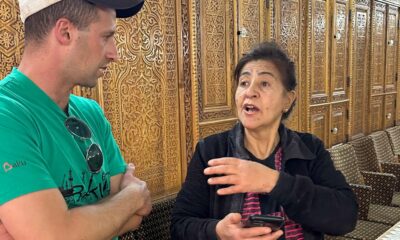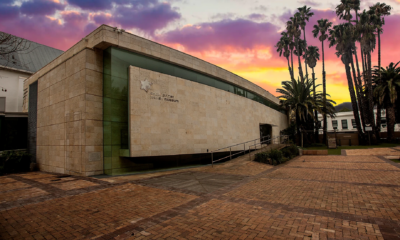
World

Israel warns of elevated terror threat over holidays
Israel’s counter-terrorism division issued a travel warning on 31 August to Israelis travelling over the high holidays cautioning them of Iran’s global terrorist threat which includes kidnappings and attacks on Israeli nationals. South Africa’s Community Service Organisation (CSO) says all Jews need to take heed.
Israel’s National Security Council Counter-Terrorism Division specifically cites Africa, Latin America, the Mediterranean Sea basin, and countries in proximity to Iran as having the highest likelihood of Iranian terrorist activity.
In its updated terrorist threat assessment for Israelis abroad, it said, “Iran still constitutes the main global terrorist threat, and is continuing to promote attacks on Israeli nationals around the world, both directly and via proxies that it operates in various countries while violating their sovereignty.
“Iranian terrorists are continuing their attempts to contact Israeli nationals, in Israel and abroad, under business covers or by impersonating other elements, in order to attack or abduct them,” the division said. “Several Iranian attempts to attack Israeli and Jewish targets have been thwarted in the past year.”
Jevon Greenblatt, the director of operations at the CSO Johannesburg, told the SA Jewish Report, “It’s common cause that Iran sees diaspora Jewish communities as the “soft underbelly” of Israel, and makes no distinction between Israeli targets and Jewish targets. Iran seeks to carry out attacks against Jewish individuals and communities where it sees a possibility for success.
“Since the nuclear deal between Iran and the West fell apart during the Trump administration, Iran has renewed its efforts to target Jews and Israelis across the world,” he says. “In recent years, there has been a particularly concerning escalation against targets outside of Israel, possibly linked to Iran feeling emboldened by what it perceives as the growing weakness of the West and Israel.
“Iran’s current modus operandi is to focus its efforts on easier targets such as prominent Israeli and, in some cases, Jewish individuals or groups,” says Greenblatt. “Tourists, tour groups, and Jewish and Israeli businessmen have also been targeted. Additionally, Iran is expending huge effort to increase its reach and influence in Africa. It feels comfortable operating on the continent, and doesn’t fear political repercussions should it decide to act against those it sees as its enemies.”
Meanwhile, the South African government continues to cosy up to the Iranian regime. South Africa hosted the 15th SA-Iran Joint Commission of Co-operation in Pretoria in mid-August, and its next engagement will be in Tehran. Iran was also invited to join the BRICS (Brazil, Russia, India, China, and South Africa) organisation from 1 January 2024.
Israel’s warning went on to say, “Various global jihad and radical Islamic organisations are continuing to carry out attacks at various sites around the world. These organisations have recently shown greater interest in attacking Israelis and Jews, and have called on supporters to attack such targets around the world. Lone-wolf terrorists, who are inspired by these organisations and who are liable to carry out attacks against Israelis and Jews, are a principal threat. It should be noted that these organisations are focusing their activity in Africa, the Middle East, Asia, and Europe alongside more sporadic efforts in additional countries.”
The statement noted, “Hamas and Islamic Jihad operatives have recently shown high motivation to carry out abductions in Israel in order to obtain bargaining chips vis-à-vis Israel. These organisations aspire to carry out abductions of Israelis or Jews abroad.”
The statement said that Jewish communities as well as other minorities have been a principal target of terrorists, with religious and community institutions being a preferred target, especially during holidays. “In recent years, religious institutions have been attacked throughout Europe and [North] America for ideological and antisemitic motives.”
According to Israeli law, Israelis are prohibited from travelling to the enemy countries of Lebanon, Syria, Iraq, Yemen, and Iran, even for dual nationals who hold additional passports. “Israelis in these countries are at very high risk of abduction or attacks on their lives,” according to the statement. “For example, academic researcher Elizabeth Tsurkov, an Israeli citizen who also holds a Russian passport, was abducted by a Shiite militia while she was illegally present in Iraq. In high-risk countries, Israelis must show greater caution and avoid external indicators of their being Israeli or Jewish.”
Greenblatt points out that in 1994, “Iran, through its terror proxies, used a vehicle bomb to attack the Argentine Israeli Mutual Association [AMIA] Jewish community centre in Buenos Aires, Argentina, killing 85 and injuring more than 300. This attack was catastrophic for the Jewish community of Buenos Aires, with the after-effects still being felt today. It was just one example of the many successful and foiled attacks carried out by Iran against Jewish targets across the world.”
Visiting professor and research fellow at the University of the Free State and research fellow at the Ezri Center for Iran and Gulf States Research at the University of Haifa, Dr Glen Segell, also points to this attack as an example of Iran’s capabilities.
“Generally, the threat level against both Israeli citizens travelling and Jews living in the diaspora increases during Jewish holidays,” he says. “Enemies find these opportune moments, and there have been serious incidents, for example the AMIA bombing, the deadliest antisemitic attack outside Israel since the Holocaust.
“Israel, like many other countries, issues travel advice to its citizens. The warnings are constantly updated. South Africa has no travel threat at the moment,” Segell says.
Hussein Solomon, senior professor in the department of political studies and governance at the University of the Free State and senior research associate of the Jerusalem-based Research on Islam and Muslims in Africa, notes that these terror groups have kidnapped in the past, and may do so again, especially as a bargaining tool.
“Regarding South Africa, there’s a strong Islamic State presence here,” he says. “Islamic State has made use of kidnapping as a means to fund its activities here in South Africa. Several businessmen have been kidnapped and then released on the payment of a ransom, which is then used to fund its various activities.
“Iran has several challenges on the domestic front, both in terms of its economy and the protests against it. If it can deflect attention to Israel or something like this, that would benefit the regime as well. The threat [of terrorism] is real and elevated, but not really for South Africa.”
But Greenblatt says, “The risk is always there. Over the past year or two, we have seen numerous plots that thankfully have been foiled. Having said that, terror organisations assign great significance to symbolism and dates, so doing something over the high holidays would be a great coup for them.
“The CSO has developed a robust structure and systems to mitigate against such threats against our community,” he says. “However, security is a collective effort requiring the whole community to work together to ensure that our facilities are well protected. Should you identify any suspicious activity around our communal facilities or become aware of any threats aimed at our community, please contact our 24-hour emergency control room immediately on 0861 800 018.”










